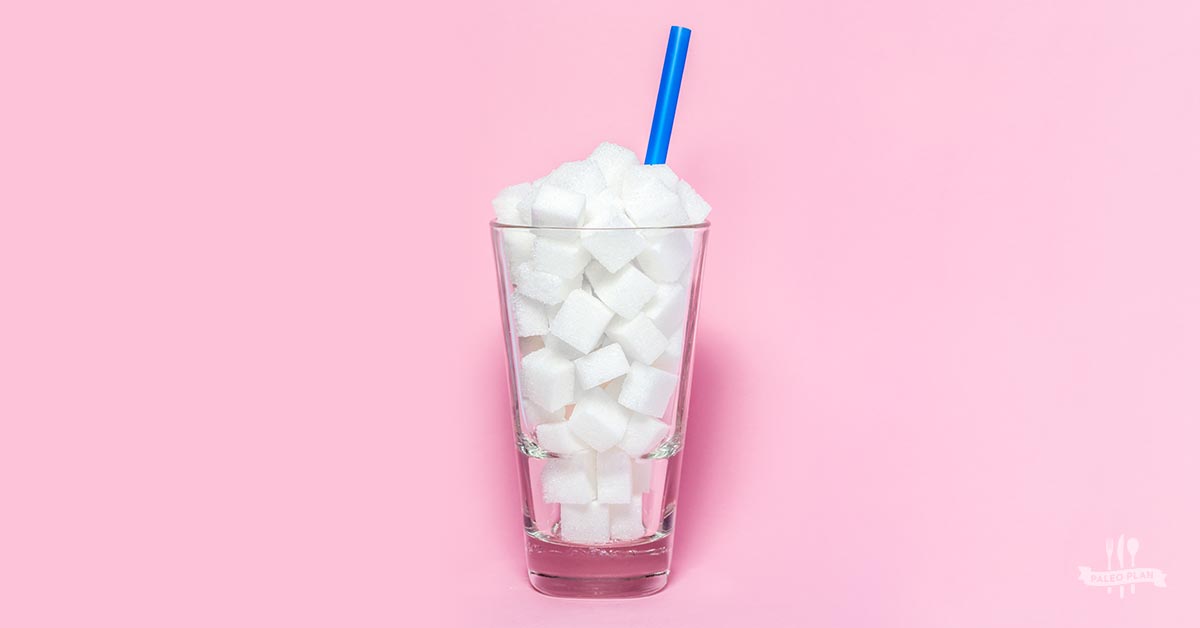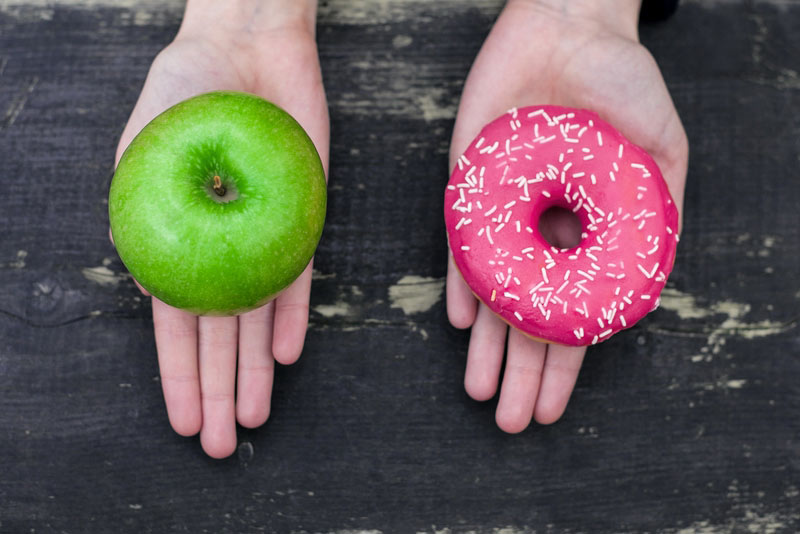How to Cut Out Sugar: 4 Sneaky Ways To Eat Less Sugar

Cut toxic sugar for good with these easy tips!
Common names for added sugar include cane sugar, high fructose corn syrup, tapioca syrup, corn sweetener, evaporated cane juice, brown sugar, fruit juice, and fructose. These types of sugars are found in most commercial, boxed, and canned foods – even ones you don’t expect to find them in, such as canned meats.
Keep in mind that these added sugars are very different from the sugar that is found naturally in foods. There is a huge difference between eating a few grapes and eating a candy bar, for instance.
In this article, we’ll cover how added sugars wreak havoc on the body, the benefits of reducing sugar intake, and easy tips to cut sugar out of your diet.
Sugar Behaves Like a Drug in Your Body

Studies show that consuming sugar triggers the same areas in your brain as addictive drugs. (1) Specifically, both drugs and sugar stimulate reward and craving pathways that create addictive behaviors.
Sugar Wreaks Havoc on Your Blood Sugar
When you eat sugar or carbohydrates, your body releases insulin to keep your blood sugar from going too high. However, if you continue to stimulate the release of insulin too often (aka eat a lot of sugar), this process becomes disrupted and can lead to diabetes. (2)
Sugar Makes You Want To Eat More, Causing Weight Gain
The last thing you want to do if you’re trying to lose weight is consume sugar. Studies show that people who eat less sugar lose more weight (an average of 1.8 pounds) compared to those who eat more sugar (gaining an average of 1.7 pounds). (3) This could be due to the ability of sugar to stimulate certain reward pathways in your brain that make you crave more.
The above dangers associated with sugar are only the tip of the iceberg. Keep reading to discover nine reasons why you’ll benefit from reducing it in your diet.
9 Benefits of Reducing Sugar in Your Diet
1. Boost Mood
It turns out that sugar can have a huge impact on your moods. In time, overconsumption can result in mood disorders, such as depression. One study found that adults who drank more than four sodas a day were 30 percent more likely to be diagnosed with depression than those drinking water, unsweetened tea, or coffee. The same was true of study participants drinking sugary fruit juices as well. (4)
2. Stabilize Energy Levels

Studies show excess sugars can suppress the activity of orexin neurons, which are responsible for feelings of wakefulness and alertness. (5) Eating too much sugar can also send your blood sugar on a rollercoaster ride, with a spike in energy followed by a crash. By reducing your sugar intake and focusing on eating real, nutritious food, you’ll give yourself a more stable energy boost that lasts throughout the day.
3. Reduce Stress
Sugar can create lasting changes in your brain and nervous system, resulting in excessive stress. Research shows that sugar consumption can be just as damaging to your brain and its ability to regulate stress as being raised in a traumatic environment during childhood. (6) This is a powerful, long-term adverse effect to keep in mind, especially if you have children who are consuming a high-sugar diet.
4. Improve Memory

On any given day, our brains produce a chemical called brain-derived neurotrophic factor (BDNF). This chemical is responsible for helping us remember daily activities – from how to drive a car to what we ate three days ago for dinner. Unfortunately, sugar has been shown to decrease the amount of BDNF produced in our brains, which can result in forgetfulness and less awareness. (7)
5. Reduce Risk of Alzheimer’s
As mentioned, BDNF plays a critical role in the development of memories, and sugar can suppress its production in your brain. Studies show that the higher your circulating BDNF levels are, the less chance you have of developing dementia. (8)
Low BDNF levels are also associated with the development of Alzheimer’s. Studies show that people with the highest levels of BDNF have less than half the risk for developing Alzheimer’s as compared to those with the lowest levels. (9) Researchers believe keeping BDNF levels high can act as a protective factor for many people who are genetically predisposed to brain disorders. So, cut your sugar intake to keep your BDNF levels high and brain healthy.
6. Curb Cravings

Unfortunately, “indulging” in a sugary treat is less likely to satisfy you than it is to make you crave more. This is because when you eat sugar, it activates the centers in your brain associated with cravings and reward. You end up wanting even more sugar in order to flood your brain with “happiness” chemicals. (10) By eliminating unnatural sugar from your diet, your brain will be able to stabilize and you’ll feel a reduced need for a sweet treat after every meal.
7. Reduce Risk of Developing ADHD
Recent studies suggest a possible link between an unhealthy, sugar-rich prenatal diet and children who develop attention deficit hyperactivity disorder (ADHD) as they get older. (11) Researchers mention that avoiding sugar and unhealthy foods during pregnancy can reduce the risk of your child developing ADHD.
How to Cut Out Sugar
It is recommended that you cap your daily sugar consumption at 10 percent or less of your daily calorie intake. For many, this will include a drastic overhaul of most sugar-containing foods in their diets, including any processed, boxed foods. However, less sugar doesn’t equal less flavor. Try the tips below to see how easy it can be to lower the sugar in your diet without compromising flavor.
1. Check Labels
Many packaged foods contain added sugars to increase their flavor. Look under “sugars” on labels and avoid any sugars that are added and unnatural (such as high fructose corn syrup). For example, your standard guacamole or salsa should not be loaded with sugar.
Also, remember that there are other terms for sugar: cane sugar, high fructose corn syrup, tapioca syrup, corn sweetener, evaporated cane juice, brown sugar, fruit juice, and fructose.
2. Try Stevia Instead

Stevia is a sugar-free sweetener that comes from the stevia plant. You can add it to coffee (a biggie since we normally have more than one cup), and even bake with it. This will eliminate a large amount of sugars, considering just a few teaspoons are enough to put you over your daily limit.
3. Eat Healthy Fats
Healthy fats like avocado, olive oil, pastured eggs, coconut oil, raw nuts and wild-caught fatty fish help keep you feeling full and satisfied throughout the day. They also add a rich depth to dishes, so you won’t miss out on flavor.
4. Swap Juice and Soda with Infused Water

Instead of consuming processed fruit juices and sodas, which are often loaded with more sugar than you should have in a week, drink infused water instead. There are endless ways to naturally flavor your water, whether it’s with slices of lemon, orange, or strawberries. If you miss the bubbly texture of soda, try using sparkling water and infusing it with your favorite fruits.

(Read This Next: Sugar Alcohol – What It Is, Pros and Cons)
The post How to Cut Out Sugar: 4 Sneaky Ways To Eat Less Sugar appeared first on PaleoPlan.
from PaleoPlan https://ift.tt/2pjKi63
Entry Published : September 19, 2018 at 01:13PM
EntryContent :

Cut toxic sugar for good with these easy tips!
Common names for added sugar include cane sugar, high fructose corn syrup, tapioca syrup, corn sweetener, evaporated cane juice, brown sugar, fruit juice, and fructose. These types of sugars are found in most commercial, boxed, and canned foods – even ones you don’t expect to find them in, such as canned meats.
Keep in mind that these added sugars are very different from the sugar that is found naturally in foods. There is a huge difference between eating a few grapes and eating a candy bar, for instance.
In this article, we’ll cover how added sugars wreak havoc on the body, the benefits of reducing sugar intake, and easy tips to cut sugar out of your diet.
Sugar Behaves Like a Drug in Your Body

Studies show that consuming sugar triggers the same areas in your brain as addictive drugs. (1) Specifically, both drugs and sugar stimulate reward and craving pathways that create addictive behaviors.
Sugar Wreaks Havoc on Your Blood Sugar
When you eat sugar or carbohydrates, your body releases insulin to keep your blood sugar from going too high. However, if you continue to stimulate the release of insulin too often (aka eat a lot of sugar), this process becomes disrupted and can lead to diabetes. (2)
Sugar Makes You Want To Eat More, Causing Weight Gain
The last thing you want to do if you’re trying to lose weight is consume sugar. Studies show that people who eat less sugar lose more weight (an average of 1.8 pounds) compared to those who eat more sugar (gaining an average of 1.7 pounds). (3) This could be due to the ability of sugar to stimulate certain reward pathways in your brain that make you crave more.
The above dangers associated with sugar are only the tip of the iceberg. Keep reading to discover nine reasons why you’ll benefit from reducing it in your diet.
9 Benefits of Reducing Sugar in Your Diet
1. Boost Mood
It turns out that sugar can have a huge impact on your moods. In time, overconsumption can result in mood disorders, such as depression. One study found that adults who drank more than four sodas a day were 30 percent more likely to be diagnosed with depression than those drinking water, unsweetened tea, or coffee. The same was true of study participants drinking sugary fruit juices as well. (4)
2. Stabilize Energy Levels

Studies show excess sugars can suppress the activity of orexin neurons, which are responsible for feelings of wakefulness and alertness. (5) Eating too much sugar can also send your blood sugar on a rollercoaster ride, with a spike in energy followed by a crash. By reducing your sugar intake and focusing on eating real, nutritious food, you’ll give yourself a more stable energy boost that lasts throughout the day.
3. Reduce Stress
Sugar can create lasting changes in your brain and nervous system, resulting in excessive stress. Research shows that sugar consumption can be just as damaging to your brain and its ability to regulate stress as being raised in a traumatic environment during childhood. (6) This is a powerful, long-term adverse effect to keep in mind, especially if you have children who are consuming a high-sugar diet.
4. Improve Memory

On any given day, our brains produce a chemical called brain-derived neurotrophic factor (BDNF). This chemical is responsible for helping us remember daily activities – from how to drive a car to what we ate three days ago for dinner. Unfortunately, sugar has been shown to decrease the amount of BDNF produced in our brains, which can result in forgetfulness and less awareness. (7)
5. Reduce Risk of Alzheimer’s
As mentioned, BDNF plays a critical role in the development of memories, and sugar can suppress its production in your brain. Studies show that the higher your circulating BDNF levels are, the less chance you have of developing dementia. (8)
Low BDNF levels are also associated with the development of Alzheimer’s. Studies show that people with the highest levels of BDNF have less than half the risk for developing Alzheimer’s as compared to those with the lowest levels. (9) Researchers believe keeping BDNF levels high can act as a protective factor for many people who are genetically predisposed to brain disorders. So, cut your sugar intake to keep your BDNF levels high and brain healthy.
6. Curb Cravings

Unfortunately, “indulging” in a sugary treat is less likely to satisfy you than it is to make you crave more. This is because when you eat sugar, it activates the centers in your brain associated with cravings and reward. You end up wanting even more sugar in order to flood your brain with “happiness” chemicals. (10) By eliminating unnatural sugar from your diet, your brain will be able to stabilize and you’ll feel a reduced need for a sweet treat after every meal.
7. Reduce Risk of Developing ADHD
Recent studies suggest a possible link between an unhealthy, sugar-rich prenatal diet and children who develop attention deficit hyperactivity disorder (ADHD) as they get older. (11) Researchers mention that avoiding sugar and unhealthy foods during pregnancy can reduce the risk of your child developing ADHD.
How to Cut Out Sugar
It is recommended that you cap your daily sugar consumption at 10 percent or less of your daily calorie intake. For many, this will include a drastic overhaul of most sugar-containing foods in their diets, including any processed, boxed foods. However, less sugar doesn’t equal less flavor. Try the tips below to see how easy it can be to lower the sugar in your diet without compromising flavor.
1. Check Labels
Many packaged foods contain added sugars to increase their flavor. Look under “sugars” on labels and avoid any sugars that are added and unnatural (such as high fructose corn syrup). For example, your standard guacamole or salsa should not be loaded with sugar.
Also, remember that there are other terms for sugar: cane sugar, high fructose corn syrup, tapioca syrup, corn sweetener, evaporated cane juice, brown sugar, fruit juice, and fructose.
2. Try Stevia Instead

Stevia is a sugar-free sweetener that comes from the stevia plant. You can add it to coffee (a biggie since we normally have more than one cup), and even bake with it. This will eliminate a large amount of sugars, considering just a few teaspoons are enough to put you over your daily limit.
3. Eat Healthy Fats
Healthy fats like avocado, olive oil, pastured eggs, coconut oil, raw nuts and wild-caught fatty fish help keep you feeling full and satisfied throughout the day. They also add a rich depth to dishes, so you won’t miss out on flavor.
4. Swap Juice and Soda with Infused Water

Instead of consuming processed fruit juices and sodas, which are often loaded with more sugar than you should have in a week, drink infused water instead. There are endless ways to naturally flavor your water, whether it’s with slices of lemon, orange, or strawberries. If you miss the bubbly texture of soda, try using sparkling water and infusing it with your favorite fruits.

(Read This Next: Sugar Alcohol – What It Is, Pros and Cons)
The post How to Cut Out Sugar: 4 Sneaky Ways To Eat Less Sugar appeared first on PaleoPlan.
via IFTTT
No comments: